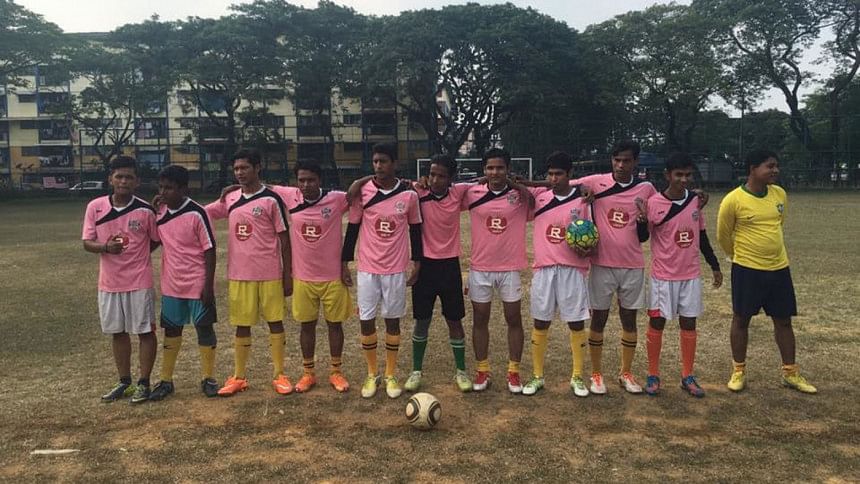Sports and the struggle for identity

Did you know that the Rohingyas have a football team of their own? Well, you can't be blamed for not knowing that, because they are not members of the FIFA or the Asian Football Confederation. Instead, they are members of the Confederation of Independent Football Associations (CONIFA). CONIFA is a football federation of teams hailing from de facto nations, regions, minority peoples and sports isolated territories, who are not affiliated with FIFA. Founded in 2013, they have organised three world cups till now, with the 2020 edition being cancelled due to the pandemic. The objective of CONIFA is to promote and celebrate people all over the world and their identities through football and cultural activities. The World Cups hosted by CONIFA are referred to as the "World Cup of the unrecognised" by the media.
Although getting membership in FIFA, the governing body of world football, is easier compared to that of the United Nations, as evident from the number of members, it is still not free from politics. According to Article 11 of FIFA Statutes, an association or an entity can be a member only if it possesses membership of a regional confederation or, in case it is not independent, the country upon which it is dependent authorises it. Getting authorisation from the occupying state is not realistic, while getting membership from regional confederations is not that simple. UEFA Statutes require recognition of majority members of the UN as an independent country in order to be a member, while CONMEBOL (the South American Football Confederation) Statutes confer membership to countries recognised by the international community as independent. The Statutes of CONCACAF (North, Central American and Caribbean Association Football) mentions taking into account the political, economic and social structures of a territory in order to grant membership.
Similarly, the Olympic Charter, after amendment in 1996, requires recognition of the entity by the international community for participation in the Olympics. On the contrary, requirements for membership in CONIFA are very flexible, as membership could be granted to even entities who are linguistic minorities. The teams that are members of CONIFA represent territories or entities that are linguistically, culturally or historically distinct from the sovereign state they are a part of. Previously, there have been similar initiatives, such as the VIVA World Cup, the UNPO Cup etc, but none of them have lasted.
In geopolitics, sporting events might not be a game changer, but it would be incorrect to underestimate its influence in the international community. Olympic Games or FIFA tournaments are enjoyed by billions of fans around the world. Boycotting sporting events, exchanging players between countries or engaging in competitions have all been used as alternative ways to send political messages or rebuild diplomatic relationships between states. In fact, East Germany used participation and success in different sporting events to bolster their claims of statehood. In recent times, Kosovo has been trying to strengthen their claims of statehood through membership in sporting bodies.
The objective behind participation in the CONIFA tournaments by different entities vary, depending on their status. For territories like Abkhazia and South Ossetia, it is a platform to make a political statement. Not being able to engage in global sporting events due to their disputed status, they aspire to send a positive message to the world about themselves. On the other hand, participation of entities such as the Rohingya or Tibet can be considered more of a protest against the states they are a part of, and they see these events as another frontier for their fight for self-determination. For entities like The United Koreans in Japan, Chagos Island and Padania, it is just a matter of celebrating their culture. Few teams like Monaco, Kiribati and Tuvalu participate only because they lack the football infrastructure for a FIFA membership. Irrespective of the status, it is safe to assume that the common goal for all the members of CONIFA is to play the game of football, bearing their own identity.
A significant number of members of CONIFA are either entities struggling for their right to self-determination or are de facto nations trying to build legitimacy and gain attention from the international community. As Bengalis, the idea of utilising football with the aspiration of gaining independence is not alien to us. During our Liberation War, we had the Shadhin Bangla football team, which played across India in order to raise awareness and financial support for the war. Created by the Mujibnagar government, the team played 16 matches in total, raising INR five lakh, which was used to buy arms for the freedom fighters. The first match that the Shadhin Bangla team played against Nadia Ekadosh on July 24, 1971, was said to have garnered an audience of around 15,000 people. The Shadhin Bangla team stood as a symbol of protest against the discrimination of the West Pakistan regime—a symbol of an independent country in the world stage. Participating entities in CONIFA, to some extent, are trying to replicate that form of protest and yearning for freedom, using the platform to generate a sense of nationalism and unity.
But such initiatives are bound to get hostile receptions from the states in control of these disputed territories and entities. CONIFA's initiatives have been blamed for providing encouragement to separatist movements. Players of the Karpatalja team were disqualified from playing in Ukraine for life by the authorities due to their participation in CONIFA. The Ukrainian Security Service even took steps to ban the players from entering the country, accusing them of "sporting separatism." China pressured sponsors to withdraw due to CONIFA's decision to allow the Tibetan team to participate. Participation of the Tamil Eelam team was met with opposition from the Sri Lankan government, who stated that inclusion of the Tamil Eelam team will "promote and support divisive, separatist tendencies as well as violence in many countries."
Similarly, the Republic of Cyprus stated that CONIFA was legitimising the Turkish annexation of Northern Cyprus by allowing them to play. Besides, holding CONIFA tournaments in disputed territories has been subject of controversy. Georgia held that the CONIFA tournament in Abkhazia was illegal since under Georgian law, anyone entering Abkhazia through Russia would be entering Georgian territory illegally and that the body lacked Georgia's authorisation. Again, the Azerbaijani community of the Nagorno-Karabakh region opposed holding a CONIFA tournament in Nagorno-Karabakh, stating that such an event poses a threat to peace and stability in the region and stands in violation of international law.
Sports encompass a significant portion of human activity. Thus, participation in sporting events under the banner of one's own identity is a part of one's right to freely participate in the cultural life of the community. The right to take part in cultural life is inseparable from human rights and fundamental to human dignity. Teams in CONIFA might not achieve the heights reached by the Shadhin Bangla team, but they are nonetheless an embodiment of the spirit held by them.
Arafat Ibnul Bashar is a student of LLM at the Department of Law, University of Chittagong.

 For all latest news, follow The Daily Star's Google News channel.
For all latest news, follow The Daily Star's Google News channel. 



Comments